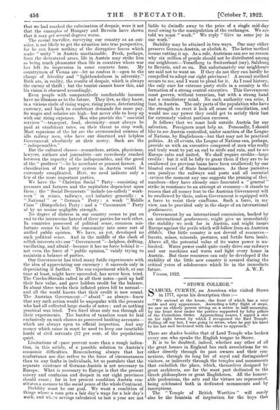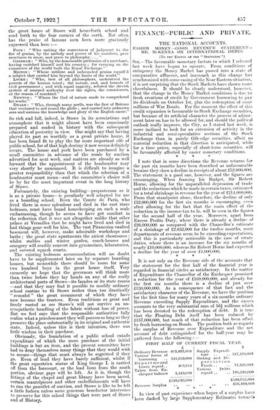" STOWE COLLEGE."
SAMUEL CURWIN, an American who visited Stowe in 1777, opens his description thus :— " We arrived at the house, the front of which has a very noble and airy appearance. Ascending a lofty flight of steps, we saw an elderly person sitting on a settee in half-mouming, by the front door under the portico supported by lofty pillars of the Corinthian Order. Approaching nearer, I espied a star on his right breast by which I recognised the Earl Temple. Pulling off my hat, I was going to retire, when he put his hand to his hat and beckoned with the other to approach."
There are shades besides that of Lord Temple who beckon every one who speaks the English tongue to Stowe. It is to be doubted, indeed, whether any other of all the great houses in England has such associations for us, either directly through its past owners and their con- nexions, through its long list of royal and distinguished visitors, or indirectly through the temples and monuments that embellish the place, which, themselves designed by great architects, are for the most part 'dedicated to the Greek philosophers or great Englishmen. All the honour- able professions, the arts and the virtues are represented, being celebrated both in dedicated monuments and by inscriptions. The "Temple of British Worthies" will surely also be the fountain of inspiration for the boys that the great house of Stowe will henceforth school and send. forth to the four corners of the earth. Not often has the praise of famous men been more graciously expressed than here :— POPE : "Who uniting the correctness of judgment to the fire of genius, by the melody and power of his numbers, gave sweetness to sense, and grace to philosophy . . . " - GRESHAM : "Who, by the honourable profession of a merchant, having enriched himself and his country ; for carrying on the commerce of the world built the Royal Exchange."
MILTON: "Whose sublime and unbounded genius equall'd a subject that carried him beyond the limits of the world." Locim : "Who, best of all philosophers, understood the powers of the human mind ; the nature, end, and bounds of civil government ; and with equal sagacity, refuted the slavish system of usurped authority over the rights, the consciences, or the reason of mankind."
NEwrox "Whom the God of nature made to comprehend his works."
DRAKE: "Who, through many perils, was the first of Britons that ventured to sail round the globe ; and carried into unknown seas and nations the knowledge and glory of the English name."
So rich and full, indeed, is Stowe in its associations and atmosphere that it might almost have been consciously prepared and soaked in history with the subsequent education of posterity in view. One might say that having played its part so worthily as a great private house, it has been found fit to play the far more important role of public school, for of that high destiny it now seems definitely secure. The house and park have been purchased by a small committee in advance of the resale by auction advertised for next week, and matters are already so well forward that the appointment of the headmaster may very shortly be announced. It is difficult to imagine a greater responsibility than that which the selection of a headmaster must mean—and the committee's choice will be by far the most important event in the long history of Stowe.
Fortunately, the existing building—preposterous as it is as a private house—is peculiarly well adapted for use as a boarding school. Even the Comte de Paris, who lived there in some splendour and died in the east state bedroom, must have found. housekeeping on such a scale embarrassing, though he seems to have got comfort in the reflection that it was not altogether unlike that other palace at Versailles that he might have lived and died in had things gone well for him. The vast Piranesian vaulted basement will, however, make admirable workshops and baths ; the great state apartments the airiest classrooms ; whilst stables and winter garden, coach-houses and orangery will readily convert into gymnasium, laboratories, and covered squash courts. The existing bedroom accommodation will no doubt have to be supplemented. later on by separate boarding houses, but meanwhile there should be room for some two hundred boys in the • great house itself. Very earnestly we hope that the governors will think more than twice before they lay hands on any of the really architectural parts of Stowe—its façades or its state rooms —and that they may find it possible to modify ordinary school routine to fit Stowe rather than too drastically "remodel" the great monument of which they have now become the trustees. Even traditions as great and firmly rooted as are Stowe's will not survive an un- sympathetic handling of the fabric without loss of power. But we feel sure that the responsible authorities fully realize what a priceless asset they will possess so long as they preserve the place substantially in its original and authentic state.. Indeed, unless this is their intention, there was little wisdom in their purchase. Obviously, the foundation of a public school entails expenditure of which the mere purchase of the initial buildings is but an item, and the present committee have had. to deny themselves many things that they would wish to secure—things that must always be regretted if they go. Even of land they have barely sufficient, whilst if the great equestrian statue of King George I. is carried off from the forecourt, or the lead lions from the south portico, obvious gaps will be left. As it is, though the fittings of the chapel and great library have been saved, certain mantelpieces and other embellishments will have to run the gauntlet of auction, and Stowe is like to be left a little forlorn unless some generous benefactor intervenes to preserve for this school things that were part of Stowe and of History.







































 Previous page
Previous page